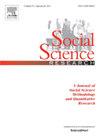1989-2015 年转型期中国下岗对死亡率和身体健康的影响
IF 3.5
2区 社会学
Q1 SOCIOLOGY
引用次数: 0
摘要
本研究探讨了转型期中国国有企业大规模裁员对健康的长期影响,这一时期的特点是经济、文化和政策发生了重大转变。利用 1989 年至 2014 年的中国健康与营养调查数据,我们采用生命历程框架来分析宏观和人际环境如何影响失业后的死亡率和身体健康。我们的分析表明,尽管下岗职工的收入受到短期干扰,且收入持续波动,但他们在二十年间恢复了收入,并获得了更多的各类医疗保险。从中期来看,我们观察到死亡率和心血管疾病有所增加,但十年后有所缓解。值得注意的是,高血压是在失业十年后才出现的。虽然城市医疗保险计划的扩大有助于降低长期死亡风险,但对其他健康结果的影响微乎其微。与在西方发达国家观察到的模式相反,转型期中国的经济机制总体上只对身体健康结果的不利影响起到了次要作用。这些发现强调了在不断变化的社会文化和政策背景下考虑时间动态和影响异质性的重要性。我们还讨论了几十年来转型期中国丰富背景下的社会心理机制。本文章由计算机程序翻译,如有差异,请以英文原文为准。
Impact of layoffs on mortality and physical health in transitional China 1989–2015
This study examines the long-term health impacts of massive layoffs from State-Owned Enterprises (SOEs) in transitional China, a period characterized by significant economic, cultural, and policy transformation. Utilizing the China Health and Nutrition Survey data from 1989 to 2014, we employ a life course framework to analyze how macro and interpersonal contexts influence mortality and physical health following job loss. Our analysis reveals that, despite short-term income disruptions and persistent income volatility, laid-off workers restored income and gained improved access to various types of health insurance over two decades. In the medium term, we observed increased mortality and cardiovascular diseases, which subsided after a decade. Notably, hypertension emerged as an outcome only after a decade of job loss. While the expansion of urban health insurance schemes contributed to reducing long-term mortality risks, the impact on other health outcomes was marginal. Contrary to patterns observed in Western developed countries, economic mechanisms in transitional China overall played only a minor role in the adverse effects on physical health outcomes. These findings highlight the importance of considering the temporal dynamics and the heterogeneity of impacts across evolving socio-cultural and policy contexts. We also discuss the social-psychological mechanisms that operate within the rich context of transitional China over several decades.
求助全文
通过发布文献求助,成功后即可免费获取论文全文。
去求助
来源期刊

Social Science Research
SOCIOLOGY-
CiteScore
4.30
自引率
4.00%
发文量
0
审稿时长
65 days
期刊介绍:
Social Science Research publishes papers devoted to quantitative social science research and methodology. The journal features articles that illustrate the use of quantitative methods in the empirical solution of substantive problems, and emphasizes those concerned with issues or methods that cut across traditional disciplinary lines. Special attention is given to methods that have been used by only one particular social science discipline, but that may have application to a broader range of areas.
 求助内容:
求助内容: 应助结果提醒方式:
应助结果提醒方式:


